Renegade by Styx
Miracles by Jefferson Starship
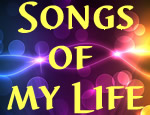 It was another Sunday after church running errands at Deerbrook Mall. It was just after Christmas, in fact – it was after my birthday. While Aunt Joyce and Uncle walked around Venture, Dave, Jim, John and I would go into the mall. My favorite places in the mall were Musicland and Waldenbooks. But this particular afternoon I was camped out at Musicland.
It was another Sunday after church running errands at Deerbrook Mall. It was just after Christmas, in fact – it was after my birthday. While Aunt Joyce and Uncle walked around Venture, Dave, Jim, John and I would go into the mall. My favorite places in the mall were Musicland and Waldenbooks. But this particular afternoon I was camped out at Musicland.
John and I were now in high school and I was beginning to get serious about music. While we were only a freshman, between my brother Dave and my cousins, we had collected a fair amount of 45’s. Last year we had started getting Albums and 8-tracks. For our birthdays, my brother Lee had given me the ‘blue’ Beatles Greatest Hits and Dave the ‘red’ Beatles Greatest Hits. By now between Dave and I, had 10 or 11 albums and almost a hundred 45’s.
My cousin Keith would eventually give me Wild Cherry’s album, the one with “Play That Funky Music.” He gave John Ted Nugent’s ‘Free For All’. I always thought he had given us the wrong albums. John was much more into Disco than I was. I would eventually go on to join Steve Dahl’s Insane Coho Lips Anti-Disco group. But Keith probably remembered John had Kiss albums – the ‘Originals, “Destroyer” and “Rock ‘n’ Roll Over” – which I had borrowed from him for a couple of weeks. Until we got into a fight and he demanded I returned his albums. I didn’t want them anyways. There were a bunch of losers, in their make-up and cool larger-than-life stage outfits. Yea, who needed Kiss. I had just gone back to my Beach Boys – though I was beginning to think maybe the Beach Boys weren’t as cool as I thought they were.
My musical tastes were beginning to open up. Last Christmas Lee had gotten me Blue Oyster Cult’s Specter album. They created the interest to get into Kiss in the first place. John had actually gone on a date – with a girl – to a Kiss concert. I was drawing their faces in junior high. The fight between John and I killed my interest in Kiss, they were stupid anyways. When Blue Oyster Cult released ‘Some Enchanted Evening’ that summer, Kiss was just a kid’s band. Ignore the fact that they were topping the charts and doing TV specials. The fact remained, my musical tastes were expanding.
While that particular day we were still doing our after-church trips to Deerbrook Mall, we were not doing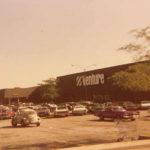 them as frequently. Our family routines were beginning to change. For example, one big change was that Turnstyle had gone out of business and a new department store named Venture had moved in. We were also allowed to roam the mall for the next hour has long as we met Aunt Joyce and Uncle Jack back at checkouts at the prescribed time.
them as frequently. Our family routines were beginning to change. For example, one big change was that Turnstyle had gone out of business and a new department store named Venture had moved in. We were also allowed to roam the mall for the next hour has long as we met Aunt Joyce and Uncle Jack back at checkouts at the prescribed time.
As we entered the mall from Venture, Musicland was our first stop. While all of us entered pass the red-bricked walls of the store, I was always a sucker for the featured albums on the endcaps of the record bins. Dave, Jim and John quickly looked at those then moved further into the store to look at the musical instruments and stereo equipment. After reviewing the end caps for sale items I would begin at the beginning of the alphabet begin looking at the various albums in the record bin. I would typically start by flipping through all The Beach Boys albums – they sure had a lot of albums.
However, that day was a little different. It was mid-January and I had gotten clearance from The Tower – Aunt Joyce and Uncle Jack – to spend money on an album. The money had come by way of birthday cards – most likely Grandma, Grandma Zilligen and Aunt Ida. So I wasn’t just looking – I was purchasing. I could almost smell the smoke from the twenty dollars in my wallet. There were so many bands I knew nothing about. There were so many albums I knew nothing about. I was just beginning to learn how much music there was to discover. The scent of ash, soot and burnt polyester was strong.
 In the late ’70s, the Disco Rage was beginning to shows signs of dissent (or the Disco Inferno was beginning to cool). There was also the release of Grease – spurred on by America’s infatuation with ‘Happy Days’, the old days, the 50’s. So there was this weird conflict of new, modern dance music with oldies from when rock n roll started. The death of Elvis Presley in ’77 also didn’t hurt. So when Elvis died, my family embraced his music. So the whole family was into the Elvis Greatest Hit 8 track that Uncle Jack had bought for the station wagon. I found his music old and boring. On the other side, I was not into new dance disco sound. But to be perfectly honest, I merely feigned my opposition to Elvis’ music. This fulfilled my need to be a rebellious teenager.
In the late ’70s, the Disco Rage was beginning to shows signs of dissent (or the Disco Inferno was beginning to cool). There was also the release of Grease – spurred on by America’s infatuation with ‘Happy Days’, the old days, the 50’s. So there was this weird conflict of new, modern dance music with oldies from when rock n roll started. The death of Elvis Presley in ’77 also didn’t hurt. So when Elvis died, my family embraced his music. So the whole family was into the Elvis Greatest Hit 8 track that Uncle Jack had bought for the station wagon. I found his music old and boring. On the other side, I was not into new dance disco sound. But to be perfectly honest, I merely feigned my opposition to Elvis’ music. This fulfilled my need to be a rebellious teenager.
This feeling would best be captured in Bruce Springsteen’s lyric from ‘Growin’ Up’: “when they said, Sit down, I stood up”. So I stood up. I would not be listening to Elvis just because the King had died. I would not join others under the Disco ball. I was not going along with what everyone else was doing. When Lee gave me Blue Oyster Cult’s ‘Spectre’ album I found a much edgier sound. I also enjoyed Uncle Jack’s grimace or Aunt Joyce’s crossed eyebrows when I played the album. I always thought their tolerance for my volume was lower when I was playing ‘Spectres’ than the others’ most acceptable Elvis or pop songs. It was the same reaction John got for his Kiss albums. Of course, I could play my Beach Boys without the Volume Police being on patrol.
At this point, I had decided not to get any more 8 track tapes. Lee had talked about a new format – the cassette tape – that was better than 8 tracks. It was like a mini reel-to-reel. It’s not that cassette tapes were new – I remember Mom had one we could record on. In fact, I would set up a cassette recorder in our bedroom New Year’s Eve to record the WLS Top 100 Songs of the year. I would warn everyone not to enter the room because I did not want them to disturb the sensitive recording studio I had set up. My ‘studio’ consisted of flipping my AM radio on top of the cassette recorder. Ah, those cherished recordings that despite spending hours to record them, I never actually listened to them.
Cassettes had moved into prerecord music and entered the automobile market. This 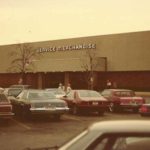 spelled the end of the 8 track tape. But adding a cassette player/recorder to our home system was not an option for Dave and I. The stereo Grandma had gotten us had a builtin 8 track player. John and Jim’s stereo had a separate 8 track player so they could get a cassette player to attach to their stereo. David and I were stuck on 8 tracks until we got a new stereo. So I was switching to vinyl.
spelled the end of the 8 track tape. But adding a cassette player/recorder to our home system was not an option for Dave and I. The stereo Grandma had gotten us had a builtin 8 track player. John and Jim’s stereo had a separate 8 track player so they could get a cassette player to attach to their stereo. David and I were stuck on 8 tracks until we got a new stereo. So I was switching to vinyl.
That Sunday morning, as I wandered around Musicland, I struggled with trying to figure out what I wanted. I had already collected a number of Beach Boys tapes so I wasn’t really interested in another one of their albums. I wanted something new like Blue Oyster Cult. I was still learning about music and who sang what songs. Dave had gotten Fleetwood Mac ‘Rumor’ album on 8 track. It was a great album. I remember first hearing parts of the album in high school when we had gym class and the pom-pom squad was practicing a routine to ‘Don’t Stop’. And when they were done practicing they let the album continue through to ‘Go Your Own Way’ and ‘Songbird’.
But while I liked Fleetwood Mac, Dave had ‘Rumors’, it wouldn’t make sense for me to buy a Fleetwood Mac album – Dave had already ‘claimed’ that band. I liked Steve Miller but I wasn’t sure about the other songs. I continued flipping through the albums but I was beginning to feel I was running out of time. Dave, Jim and John had long continued on to other stores. I was reviewing the albums Musicland had chosen to market to casual mall patrons for the 3rd or 4th time.
“Hey Trike,” Dave called from the mall. “We’ve got to meet Aunt Joyce and Uncle Jack in Venture.”
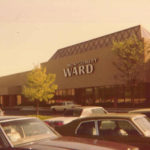 The final moments were now at hand. A decision was needed. I picked up Styx’s Pieces of Eight, which was on my ‘For Sure’ list. Once again I was drawn to the shiny gold cover of the Jefferson Starship ‘Gold’ album. You could actually feel the raised letter of the album. With “Pieces of Eight” already in my hands, it was easy for the kid working at the store to talk me into the shiny new album with the raised lettering.
The final moments were now at hand. A decision was needed. I picked up Styx’s Pieces of Eight, which was on my ‘For Sure’ list. Once again I was drawn to the shiny gold cover of the Jefferson Starship ‘Gold’ album. You could actually feel the raised letter of the album. With “Pieces of Eight” already in my hands, it was easy for the kid working at the store to talk me into the shiny new album with the raised lettering.
“That’s their greatest hits, ” he said.
Sold! I just needed an excuse. Time was short and my window was closing. I’m pretty sure a blister forming on my rear right cheek through my wallet. I grabbed the album from the holder and brought both up to the store counter. While I knew the total was going to be a little over $12 dollars, I still continued to misjudge how much the tax would be.
Shoving the change in my pocket, I grabbed my bagged albums and raced from the store into the mall which was just outside of Venture. Passing the checkout counters set up for the Venture partons that were going into the mall, ignoring any potential glances that may have been given on my potential risk of shoplifting with an open Musicland bag.
By the time I made it to the regular checkout counters, John, Jim and Dave were neatly stacked behind Aunt Joyce while Uncle Jack did not look happy.
“Did you forget your watch?” he sarcastically asked as he countered out his bills to the cashier for Aunt Joyce’s purchases.
“No…,” I started.
But Aunt Joyce asked if we were ready with the bagged purchases into the shopping cart thus saving me from further questions. We all escorted Aunt Joyce to the station wagon. We piled into the station wagon, John and I opting for the back seat.
That is the rear-facing back seat of the station wagon. 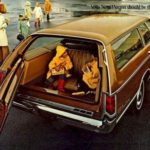 This was well before any seat belt laws. While the station wagon had seat belts they were all neatly tucked away and unreachable. We never feared for our lives. John was complaining that he (and I) were too big to be sitting in the back seat. The current process was ‘taking turns’. Those who sat in the ‘way back’, as the rear-facing seat was referred to, on the way there (where ever we were going) would get to sit in the regular back seats on the way back. But this wasn’t fair for those two stop trips – such as our mall trips after church. John was voicing his displeasure in this system.
This was well before any seat belt laws. While the station wagon had seat belts they were all neatly tucked away and unreachable. We never feared for our lives. John was complaining that he (and I) were too big to be sitting in the back seat. The current process was ‘taking turns’. Those who sat in the ‘way back’, as the rear-facing seat was referred to, on the way there (where ever we were going) would get to sit in the regular back seats on the way back. But this wasn’t fair for those two stop trips – such as our mall trips after church. John was voicing his displeasure in this system.
When we got home, we would get out of our Sunday clothes and get into our ‘play clothes’ which consisted of jeans and a t-shirt. Sunday dinner was typically our bigger meal, like supper. Ever since Aunt Joyce and Uncle Jack had the porch enclosed and insulated we had a kitchen table added so we could all sit around the table together. The fact was John was right, we were getting too big. As ‘us boys’ were continued to grow and we could no longer fit two boys to a bench around the old kitchen table.
This particular meal was longer then I wanted. As soon as appropriate I asked to be excused. This was the rule at our meals. We would say grace, have our meal and we would need to ask if we could ‘be excused’ from the table. This would give Aunt Joyce or Uncle Jack a chance to check our plates for food that could be sent to the African Children. All through the entire meal, I couldn’t wait to get to my bedroom so I could listen to my new purchases. With permission granted from Uncle Jack, I brought my dishes to the sink and stole away to my bedroom.
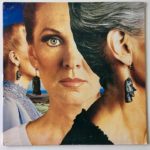 Both albums were gatefold which meant after the plastic was removed the album would open to reveal additional album artwork. One side would contain the album, the other side would typically be glued shut. The Styx album revealed the band members bust as Easter Island heads. I pulled the album out and saw the band included the lyrics on the liner sleeve. Including the lyrics would become an important feature to me. I removed our stereo’s dust cover and set up my first listen to side one of Styx’s ‘Pieces of Eight’. Dropping the tonearm on the groove of side one I stretched out on my bed with the inner sleeve in hand.
Both albums were gatefold which meant after the plastic was removed the album would open to reveal additional album artwork. One side would contain the album, the other side would typically be glued shut. The Styx album revealed the band members bust as Easter Island heads. I pulled the album out and saw the band included the lyrics on the liner sleeve. Including the lyrics would become an important feature to me. I removed our stereo’s dust cover and set up my first listen to side one of Styx’s ‘Pieces of Eight’. Dropping the tonearm on the groove of side one I stretched out on my bed with the inner sleeve in hand.
Looking over the sleeve, an announcer began to ask for my attention. It was Dennis DeYoung beginning “Great White Hope”. I followed all the lyrics to “I’m Ok”. I knew “Sing for the Day”, which I only thought was only OK. Waiting for “The Message” to finish I was eagerly anticipating “Lords of the Ring” having read “The Hobbit” and halfway through “The Fellowship of the Ring”. During “The Message” I skimmed the lyrics and saw no mention of Frodo, Gollum or any characters from Lord of the Rings. “Lords of the Ring” concluded and I swing my legs off the bed to flip the album.
I was looking forward to “Blue Collar Man,” John already had the 45 and was another reason I wanted this album. I tipped the volume knob ever so slightly up to give our single speaker boxes as much help as possible but not draw the attention of the Volume Police. Keyboards rattled the speakers on their shelves. During the second chorus, Aunt Joyce’s head popped through the door.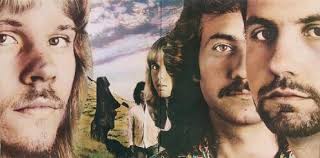
“Trike!” she yelled above Dennis DeYoung’s keyboard, “Turn it down!”
I immediately grabbed the volume and turned it noticeably lower. I swore that I would always be told to lower my music before John had to. But as while I was wallowing about my unjustice, I was missing Dennis explain what it was to be a blue-collar man.
I spent “Queen of Spades” going back and forth on how unfair I was being treated by Aunt Joyce and how lucky I was to be living with them. At sixteen years old – the sour grapes were winning. I eventually returned to the liner sleeve and the lyrics of “Queen of Spades.” When “Renegade” started with its acapella beginning, I was entranced. When the entire band kicked in behind Tommy Shaw’s yell I got chills. The jig was up and I that emotional high I wanted to repeat over and over. That discovery of a new song that I could connect to. But it wasn’t just the shivers down my spine. That was just part of it.
The other part was when John began knocking on my door. “Who is that?” he asked. He had heard the song on the radio. I proudly turned over the Pieces of Eight album and we stood listening to Tommy Shaw, Dennis DeYoung and the rest of the band finish the song.
“Can I borrow this?” John asked.
“When I’m finished,” I replied. Jeez, I thought, let me finish the album.
“Yea, Yea, Yea,” John replied waving off the album cover. “Yea, when you’re done.”
The album finished the finale “Pieces of Eight” and then the forgettable “Aku-Aku”. I brought the album over to John’s room. The emotional connection to ‘Renegade’ was key but having the song that connected with other people also became important. I returned to my room for my next album.
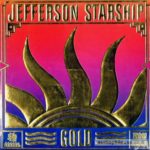 Jefferson Starship’s “Gold” did not have the same impact as “Pieces of Eight”. While the gatefold cover revealed their past albums the songs were not as exciting. Through “Miracles” I thought I remembered hearing it on the radio in the car with my parents. Or it may have been wishful thinking. The songs were polished and they were all good; not as uneven as “Pieces of Eight”. But you would expect that from a greatest hits album.
Jefferson Starship’s “Gold” did not have the same impact as “Pieces of Eight”. While the gatefold cover revealed their past albums the songs were not as exciting. Through “Miracles” I thought I remembered hearing it on the radio in the car with my parents. Or it may have been wishful thinking. The songs were polished and they were all good; not as uneven as “Pieces of Eight”. But you would expect that from a greatest hits album.
I was curious about what was on the other albums: “Dragon Fly”, “Red Octopus”, “Spitfire” (l loved the cover with the dragon) and “Earth”. I was intrigued with raised ‘punch printed’ album cover of “Gold”. I kept running my fingers over the raised letters and ridges of the front cover. The inner sleeve did not provide any lyrics, just a bland generic paper sleeve. The next 47 minutes and 38 seconds I got to know Jefferson Starship. As I listened I grew more curious about their past albums, a curiosity I would never explore. But I did become a fan which would be reinforced with their next album release “Freedom at Point Zero”.
This binge of album purchases set me up for a 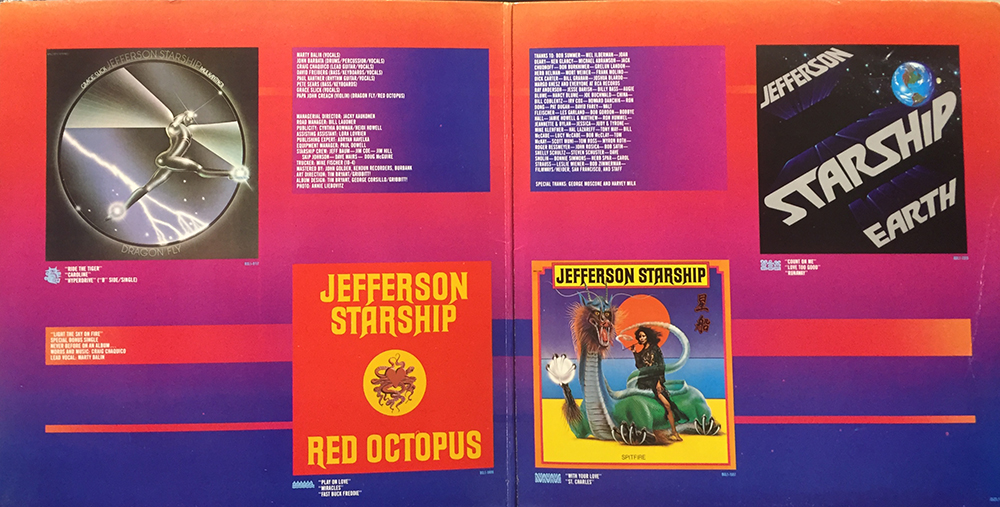 lifetime hobby. One that would take me to dozens of record stores in the Chicagoland area. It set me up on how I would purchase records in the future. My album collection would grow based on my quest for a song or artist that other people would eventually come to be impressed with. And like the general public, when that song or artist became too popular sometimes my interest would wane. I would also continue to be a sucker for gimmickry album covers and marketing strategies, always curious about what the music on the vinyl inside sounded like.
lifetime hobby. One that would take me to dozens of record stores in the Chicagoland area. It set me up on how I would purchase records in the future. My album collection would grow based on my quest for a song or artist that other people would eventually come to be impressed with. And like the general public, when that song or artist became too popular sometimes my interest would wane. I would also continue to be a sucker for gimmickry album covers and marketing strategies, always curious about what the music on the vinyl inside sounded like.
I would so begin to purchase multiple albums at the same time. Spending $20 on records would turn into $40 and $50 at a time bring home 4, 5 or 7 albums at a time. Eventually, Aunt Joyce and Uncle Jack would tell me I couldn’t spend all my money on records. So I would have to sneak my new purchases into the house. Occasionally they would notice my growing record collection and I would have to go months without my new hobby.
Collecting albums became a lifetime and a defining trait of myself. I don’t think it would be going too far to say it a defining part of who I am as a person. Music became a connecting point for me to others. My best friends, who would later be defined at Greg and Jeff, would also have strong music interests. I knew people who when they talked about me would know music was a big part of my life. Obsessive? probably but I still understood music was only one part of many that make me who I was and who I would become.
Collecting albums was a critical part of my music interest. While I would like to say that actual music was more important, both aspects actually went hand in hand. Having knowledge was key but I had a long way to go in that department. My sources would be my friends, the radio, the record stores I would visit, the occasional magazine and the library. One of my favorite sources were the music charts. While many radio stations had their own charts, the king of the charts was the Billboard. While this didn’t actually provide any musical knowledge this was how I would determine where to begin my exploration. This gave my music tastes a very pop-orientation though I was very willing to experiment. I also never had a ‘rebel’ attitude – liking something because other people didn’t like it – despite my initial aversion to Elvis and Disco. I was looking for an understanding of my life in the music l was listening to as I laid on my bed. Lyrics were very important. To me, “lyrics could save a song.” While I loved melodies and especially the hooks, simple lyrics or cool concepts with a simple melody would win me over every time.
The real problem with my new album collecting hobby was money. Us boys made money by delivering newspapers. I don’t remember the name of the newspaper, but it was a weekly newspaper that we delivered on Thursday. Initially, we could only take this job as long as we didn’t need to collect any money from the customers. However, within a few months, we were required to collect money for subscriptions. This actually turned out to be fortunatus. As we went from house to house we found out a lot of people who didn’t want the paper we were delivering in the first place. In fact, they were very clear that we were NOT to leave any more papers on their doorsteps. We ended up dropping about 80% of our deliveries. This made our routes much easier. The newspaper, however, still dropped off the same amount of papers each week. These extra papers would build up in the garage. So every few weeks, Uncle Jack and a couple of us boys would sell the papers to a scrap yard.
These Saturday morning trips to the scrap yard began a fond routine with Uncle Jack. I had already realized Uncle Jack didn’t take the shortest routes to where he was going. He could have taken to the tollway and the whole trip would have taken 15 minutes. But that would have cost 25 cents each way. Years later I would realize he could have taken Waukegan road, the main road that took one North, to save the 25 cents but he didn’t take that route either.
Prior to those morning drives, ‘the boys’ would daisy-chain handing bundles of papers to each other filling up the back of the station wagon. There were typically so many we would have to put the back seats down to fit them all. Many times we would do this the night before and the station wagon would be backed in ready for its early departure. We would typically leave between 7 to 8 am. Being an early riser so I would almost always accompany Uncle Jack on these morning runs.
The route to the scrapyard was comfortable – peaceful, quiet. It was as close to a country drive as you could do in the Northern suburbs of Chicago. From Wilmot Road, Uncle Jack would turn left on to Duffy Lane, a quiet road with regular houses on bigger lots. We would typically not see another car that early in the morning. When Duffy would dead end, he would take a right onto Riverwoods Road.
As the ride with Uncle Jack continued the houses got more expensive and moved up in their lots. These houses looked more like our houses around the lake where we lived. When we crossed Route 22 (this is the road that took us to my brother Lee’s house in Lake Zurich) we were starting to get out of our ‘normal’ routes though we could still be going to Hawthorn, the mall in Vernon Hills. But these mornings Uncle Jack continued straight on Riverwoods Road instead of taking a left on Everett Road. From here we were on less-traveled roads. I would rarely ever take this route even when I could drive. Uncle Jack only took this route when we were dropping off the papers at the scrap yard.
The houses now all but disappeared into their lots leaving the people that lived in them an idle curiosity. The avoided tollway appeared on our right and the early morning truck drivers would break our morning calm. The drive was calm. There wasn’t a lot of talking, just the radio. I would typically have my nose into one of my books. When Riverwoods Road steered us more eastward, we lost sight and sound of the tollway and back to our radio. Soon we would have to stop at Route 60 at stop signs that would eventually be changed to stoplights and continue our journey north.
Once on the other side of Route 60, the lots now just changed to plain fields with no houses at all. But the fields eventually gave way to big mowed lawns of expensive homes of fancy subdivisions. Out of nowhere, we were suddenly flying over the tollway on a bridge. A field and a church gave way to more fields. After a few company buildings and a railroad, the homes were gone for good which meant we were coming into ‘town’ and we were almost at the scrap yard. At the stop sign, we now took a right and there were only business buildings on Route 176.
It was a quarter-mile drive, just before the railroad tracks, when we arrived at Rondout Iron & Metal. It was an oily dirty junkyard. It didn’t smell like a dump, it smelled mechanical. The station wagon would waddle through the uneven gravel to the scale by the office. We would be weighed and then motioned onward to the loading dock. I and whoever was with would run to the back and open the station wagon’s back door. There would be one or two young men on the loading dock who we would toss the newspaper bundles to. I say toss but sometimes we would struggle through it seemed each trip it would get easier. Once the station wagon was unloaded we would be weighed again. Uncle Jack would then pull off the scale go inside to collect our money. The early morning sun would try but it never dried the oil and mud of the junkyard. The station wagon would waddle out of the yard as Uncle Jack navigated the potholes to take us home, the sun a little higher, the shadows a little shorter.
Uncle Jack loved to take these routes. GPS’s call them alternate routes. Google Maps call them scenic routes. In a few years, I would learn that Supertramp called them ‘The Long Way Home’. He would take them through Riverwoods when we would go to Wheeling. Or through Lake Forest when he would come back from his Saturday Morning banking trips. If we went with on his banking trip, we would marvel at all the big expensive houses he would pass as he drove through Lake Forest. Sometimes he would comment about Mr. So-So who works at Blah Blah Important Company lives on this street and I would imagine butlers and maids scurrying around large rooms and big backyard patios. Over the years I would wonder why they would need such big houses. And those displays of wealth would leave a bad taste in my mouth, or rather a canker sore. I believe it was Krokus who said ‘Eat the Rich.’
 Years later through a few series of friends of friends, I would DJ a small private party in one of those houses. They did not have butlers or maids but they did have people serving their catered food. I set up in a corner of their living room – pass their life-sized cabbage patch dolls that would be seated in the hallway to the kitchen area. Above their large fireplace, they proudly displayed the largest spin-art I’d ever seen. I did not hold the same of affection or respect for the signs wealth that my friends did, particularly Ralf. While Uncle Jack would sometimes fall into the racial profile of Jews and money, he had a strong respect for money and the people who accumulated it.
Years later through a few series of friends of friends, I would DJ a small private party in one of those houses. They did not have butlers or maids but they did have people serving their catered food. I set up in a corner of their living room – pass their life-sized cabbage patch dolls that would be seated in the hallway to the kitchen area. Above their large fireplace, they proudly displayed the largest spin-art I’d ever seen. I did not hold the same of affection or respect for the signs wealth that my friends did, particularly Ralf. While Uncle Jack would sometimes fall into the racial profile of Jews and money, he had a strong respect for money and the people who accumulated it.
When we finally arrived home from our trip to the scrapyard, or sometime it would happen after Uncle Jack did his Saturday morning banking, we would gather around the kitchen table. Ceremoniously Uncle Jack would display the total take from the scrapyard paper money, show his division by four, include our allowance and neatly lay out the bills and coins into four equal piles. We would greedily swipe the bills and coins into our hands and scurry back to our bedrooms like bridge trolls. But we would dutifully drop our pennies in our pennies jugs. I drop any nickels I had in the jar I used to collect my nickels in. I miss those young huddled morning ceremonies and I think Uncle Jack enjoyed the attention from his four little bridge trolls. But more than anything I miss those long scenic drives the Northern Chicago suburbs with Uncle Jack. Uncle Jack would continue his drives without us and would spontaneously show up at our homes to drop off food items or little things for the grandkids. I know he loved stopping by but I also suspected he loved taking the long way home. Its a trait he’s passed to me when I can afford the time.
So from delivering the wanted papers and selling the unwanted papers each of us would make about $10 a week. They say to get a job you have to have a job. This would be true in high school because soon I would be getting a new job – a regular job at Deerfield Tennis Courts where I could make that is 2 nights! So my first real job I was making $1.95 an hour.
But like any kid – my ‘wants’ were always more than my budget. And now my ‘wants’ were in the form of flat black vinyl discs. I would buy what I could get into the house, and if I got caught, I would be banned from future purchases. This meant I would just have to be very careful when I brought albums into the house the next time. While getting the albums to my bedroom could be tough, what albums I should actually purchase was getting tougher. There were so many choices. These two albums, Styx’s ‘Pieces of Eight’ and Jefferson Starship’s ‘Gold’ represented two key ways I would make my purchase decisions.
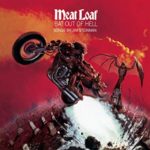 First, album covers would always be part of my decision-making process (and eventually cd’s). The embossed, raised printing of the Jefferson Starship album was a big factor in that purchase. I was subject to gimmicks and cool artwork when it came to my album purchases. So over the next months, I would purchase Meatloaf’s ‘Bat Out of Hell’, Molly Hatchet and Gamma’s debut albums simply because of their covers. I had no idea how the music sounded. And while I knew AC/DC did that “Highway to Hell” song, it was subtle inclusion the devil tail drawn in on the cover that sealed that purchase.
First, album covers would always be part of my decision-making process (and eventually cd’s). The embossed, raised printing of the Jefferson Starship album was a big factor in that purchase. I was subject to gimmicks and cool artwork when it came to my album purchases. So over the next months, I would purchase Meatloaf’s ‘Bat Out of Hell’, Molly Hatchet and Gamma’s debut albums simply because of their covers. I had no idea how the music sounded. And while I knew AC/DC did that “Highway to Hell” song, it was subtle inclusion the devil tail drawn in on the cover that sealed that purchase.
And while the cover was important, many times just the fact that it was a new release was just as important. This led to the purchase of Queen’s ‘Jazz’, Eric Clapton’s ‘Backless’, Bad Company’s ‘Desolation Angels’, Cheap Trick’s ‘At Budokan’, Jethro Tull’s ‘Stormwatch’ and The Eagle’s ‘The Long Run’.
But I was collecting – so when one of ‘my bands’ released new album, that was a required purchase. When Blue Oyster Cult (BOC) released ‘Mirrors’, that was an easy decision. Lee had given me BOC’s ‘Specters’ a few years ago, then I picked up their ‘Some Enchanted Evening’ album on an 8 track. I was collecting Blue Oyster Cult. I had decided to purchase everything on vinyl, no more 8 tracks. So when Styx’s released ‘Cornerstone’, I bought it. When Jefferson Starship released ‘Freedom Point Zero’, I bought it.
I also viewed each of ‘us boys’ as ‘collecting’ bands or artists. So I couldn’t buy someone else’s band. So Dave was buying Fleetwood Mac’s albums so I couldn’t buy ‘Rumours’ or ‘Tusk’. John was collecting ELO so I couldn’t buy ‘Discovery’, even though Dave had ‘Out of the Blue’. Jim never really collected albums, he never really got past 45’s. There was literally a whole world of music waiting to be explored – as long as I didn’t start collecting someone else’s band.
To find my music I relied on my friends, mainly Greg and Jeff, along with a neighbor friend Todd Combs. In high school, I had switched radio stations from WLS to The Loop led by morning DJ Steve Dahl. And of course my local record stores. I would soon outgrow the Deerfield Record Shop (sorry, Lenny!) and switch to Laurie’s which had opened up in the Deerfield Commons. These recommendations included Rush’s ‘Permanent Waves’, J. Geils Band’s ‘Love Stinks’, UFO’s “No Place To Run”, Bob Seger’s “Against The Wind”, Journey’s “Departure” and Genesis’ “Duke”.
Over the next several years, I would average 30 to 40 albums purchases a year. While I would continue to succumb to the allure of great artwork and would crave the latest releases, I was also learning about key albums and artists I had missed. Not too unlike the charts I was following of albums I would mentally rank the classic bands and artists. Led Zepplin, The Who, Pink Floyd, The Beatles, The Rolling Stones, that list would forever be growing.
Lee had given Dave and I the two Beatles Greatest Hits albums, The Red and The Blue albums as they were known as. For my Beatles collection, this would suffice for the time being. But as I would reach out to a particular artist, I would need to decide to purchase the greatest hits or a ‘classic album’ of their catalog. For example, I had been integrated by the fact that “Stairway to Heaven” by Led Zeppelin had never been released as a single. So one of my first ventures into the past was the purchase of Led Zeppelin’s “IV” (or ZoSo, Runes, Fourth as it would be called). Originally released in 1971, it seemed strange to listen to such old music like the Beach Boys but Led Zeppelin was still cool.
I knew by this age that what I told my friends I was listening to 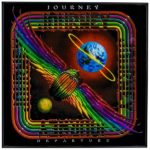 mattered. I was too socially unstable to get away with telling them I still liked the Beach Boys. Journey, AC/DC, Genesis and Rush ruled the schools now. While I still purchased Beach Boys’ albums I would not share this fact with my friends. It would be years before we all matured enough to allow each of us to go outside the imaginary peer boundaries we had set up for ourselves and each other.
mattered. I was too socially unstable to get away with telling them I still liked the Beach Boys. Journey, AC/DC, Genesis and Rush ruled the schools now. While I still purchased Beach Boys’ albums I would not share this fact with my friends. It would be years before we all matured enough to allow each of us to go outside the imaginary peer boundaries we had set up for ourselves and each other.
I began to search and explore all the music I was exposed to. And with the demands of school, family, friends and work I had to decide how to spend my listening time. I would soon be driving so control over the radio would offer more time – when friends were not in the car. A boombox would allow me to bring my music with me but would present other problems. Until I got my own car and installed a cassette player I would have The Loop 98.7 to guide me at the end of the seventies and into the next decade.
And while my friends and family would guide my musical tastes, I would eventually outpace them in my musical knowledge and thirst for more. But for now, we were turning each other on to the music. We were discovering the music of the late seventies, though from our skewed youthful perspectives.
Disco was beginning to die, punk was being discovered, the keyboards for New Wave were only then being set up, Heavy Metal was retooling and Southern Rock had seen its high noon. We would not have the anthems of war or protests, so our view of past music was more romantic and naive. Our view of older music was based on what our radio stations and older siblings played for us. Resources were finite, time was finite and I had to choose between discovery and depth. I would make choices based on album covers and many times what the latest releases were. I devoted a lot of money to music – always to toward the media and less on the equipment or concerts. A hobby was born that would shape my next forty years.
